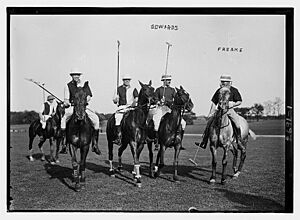Frederick Freake facts for kids
Quick facts for kids Olympic medal record |
||
|---|---|---|
| Men's polo | ||
| Representing a |
||
| Silver | 1900 Paris | Team competition |
| Representing |
||
| Silver | 1908 London | Team competition |
Sir Frederick Charles Maitland Freake (born March 7, 1876 – died December 22, 1950) was a talented British polo player. He competed in the Olympic Games twice, winning silver medals each time. He was known for his skill in the sport of polo, which is played on horseback.
Contents
Early Life and Education
Frederick Freake was born on March 7, 1876. He attended Magdalene College, Cambridge, a famous university in England. His education helped prepare him for a life that included sports and public service.
Olympic Polo Achievements
Sir Frederick Freake was a successful polo player. He earned two silver medals at the Olympic Games.
1900 Paris Olympics
In 1900, he was part of the BLO Polo Club Rugby team. This team competed in the Paris Summer Olympics. They played well and won a silver medal for their country. Polo was a popular sport at the time.
1908 London Olympics
Eight years later, Frederick Freake competed again. This time, he was a member of the Hurlingham Club team. They played in the London Summer Olympics. His team once more achieved a silver medal. This showed his consistent skill in the sport.
Later Life and Public Service
In 1920, Frederick Freake became the 3rd Baronet of Cromwell House and Fulwell Park. A "Baronet" is a special title, like a knight, that can be passed down in a family. He lived at the Old Manor House in Halford, Warwickshire.
He also served his community. In 1939, he became the High Sheriff of Warwickshire. A High Sheriff is an important official. They represent the King or Queen in their county. Sir Frederick Freake passed away on December 22, 1950.
Family Life
Sir Frederick Freake married Alison Ussher. Their wedding took place on July 7, 1902. They were married at St. Peter's Church in Cranley Gardens. Alison was the daughter of Christopher Ussher.


